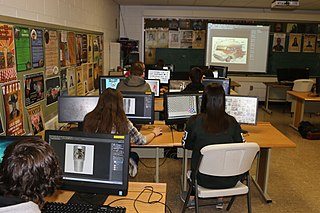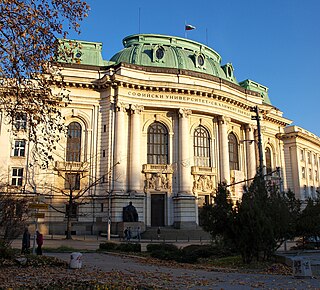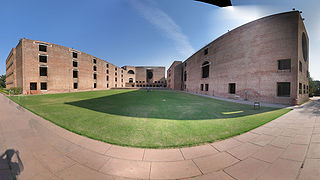
A college is an educational institution or a constituent part of one. A college may be a degree-awarding tertiary educational institution, a part of a collegiate or federal university, an institution offering vocational education, a further education institution, or a secondary school.

Tertiary education, also referred to as third-level, third-stage or post-secondary education, is the educational level following the completion of secondary education. The World Bank, for example, defines tertiary education as including universities as well as trade schools and colleges. Higher education is taken to include undergraduate and postgraduate education, while vocational education beyond secondary education is known as further education in the United Kingdom, or included under the category of continuing education in the United States.

A student is a person enrolled in a school or other educational institution.
In the education systems of England, Northern Ireland, Wales, Barbados, Jamaica, Trinidad and Tobago, and some other Commonwealth countries, sixth form represents the final two years of secondary education, ages 16 to 18. Pupils typically prepare for A-level or equivalent examinations like the International Baccalaureate or Cambridge Pre-U. In England, Wales, and Northern Ireland, the term Key Stage 5 has the same meaning. It only refers to academic education and not to vocational education.
A junior college is a type of post-secondary institution that offers vocational and academic training that is designed to prepare students for either skilled trades and technical occupations or support roles in professions such as engineering, accountancy, business administration, nursing, medicine, architecture, and criminology. Often times, those types of colleges offer 2-year associate's degrees that are intended for students that want to later transfer to a 4-year bachelor's degree to finish their undergraduate education, pending a C or better average in all coursework attempted, depending on the country. Students typically attend those types of colleges for 1-3 years, which is also dependent on the country.

A vocational school, trade school, or technical school is a type of educational institution, which, depending on the country, may refer to either secondary or post-secondary education designed to provide vocational education or technical skills required to complete the tasks of a particular and specific job. In the case of secondary education, these schools differ from academic high schools which usually prepare students who aim to pursue tertiary education, rather than enter directly into the workforce. With regard to post-secondary education, vocational schools are traditionally distinguished from four-year colleges by their focus on job-specific training to students who are typically bound for one of the skilled trades, rather than providing academic training for students pursuing careers in a professional discipline. While many schools have largely adhered to this convention, the purely vocational focus of other trade schools began to shift in the 1990s "toward a broader preparation that develops the academic" as well as the technical skills of their students.

A sixth form college is an educational institution, where students aged 16 to 19 study typically for advanced post-school level qualifications such as A Levels, Business and Technology Education Council level 3 (BTEC), and the International Baccalaureate Diploma, or school-level qualifications such as General Certificate of Secondary Education (GCSE) examinations and BTEC level 2 qualifications. In many countries this type of educational institute is known as a junior college. The municipal government of the city of Paris uses the phrase 'sixth form college' as the English name for a lycée.

Twelfth grade is the twelfth and final year of formal or compulsory education. It is typically the final year of secondary school and K–12 in most parts of the world. Students in twelfth grade are usually 17–18 years old. Some countries have a thirteenth grade, while other countries do not have a 12th grade/year at all.

Education in Bulgaria is guided and overseen by Bulgarian Ministry of Education and Science. Compulsory education includes three years of pre-primary education, primary education, and secondary education. The schools start by age of seven and end the age of 18. Compulsory education at state schools is free of charge. The state and private higher education schools, colleges and universities charge fees, although they offer students scholarships.
Udayan Higher Secondary School Dhaka, formerly known as Udayan Bidyalaya is a private higher secondary school in Bangladesh, established in 1955 by the University of Dhaka. It is a co-educational institution.
Higher Secondary Certificate (HSC), Higher Secondary School Certificate (HSSC) or Higher Secondary Education Certificate (HSEC) is a secondary education qualification in Bangladesh, India and Pakistan. It is equivalent to the final year of high school in the United States and GCSE and/or A level in the United Kingdom.

Vivekananda Institution is a high school in West Bengal, India. It is located in the Howrah district of West Bengal. The school was established in 1922 and is inspired by his philosophy "Education is the manifestation of the perfection already in man". The school is a leading performer in the secondary and higher secondary exams of the state of West Bengal. The school is located at 75 & 77 Swami Vivekananda Road, Santragachhi, Howrah 711104, India.

Gujarat is a state situated in the western part of India and shares its northwestern boundary with Pakistan. Rajasthan, Madhya Pradesh and Maharashtra are the neighboring states of Gujarat. Gandhinagar is the capital city of the state and Ahmedabad is its largest city and the main commercial hub of the region. Gujarat houses a wide variety of industries and is considered one among the best industrialized states of the nation. Gujarat is also home to some of the prestigious educational institutes of the nation.

The Ministry of Science and Education of the Republic of Azerbaijan is a governmental agency within the Cabinet of Azerbaijan in charge of regulating the education system in Azerbaijan.

In India, the Department of General Education is the Government of Kerala's body for school education. Founded in 1995, The department administers school education from pre-primary level to the higher secondary level and teacher training the department is in charge of conducting Secondary School Leaving Certificate examinations in Kerala State. Secondary School Leaving Certificate examinations are usually held in March and results are announced on April or May.
The Mizoram Board of School Education (MBSE) is an autonomous governmental body for academic administration in Mizoram, India, having its jurisdiction from elementary to higher secondary education. It was established by the Government of Mizoram in 1975 by the Mizoram Board of School Education Act. It has the power to regulate, supervise and control school education in Mizoram. Its primary function is to prepare academic programmes and organise examinations, especially for state level High School Leaving Certificate (HSLC) and Higher Secondary School Leaving Certificate (HSSLC). From 2012, the board also conducts State Technical Entrance Examination (STEE) for entry into technical courses such as engineering, medicine, veterinary science, pharmacy, nursing, homoeopathy, and dentistry.

The Assam Higher Secondary Education Council (AHSEC) was a state education regulatory board under the jurisdiction of Ministry of Education, Government of Assam that is responsible to regulate, supervise and develop the system of Higher Secondary Education in the State of Assam.
Palam or Palma is a small village 8 km from district Rajauri, Jammu and Kashmir, India, on the bank of Khandal river. Maize, rice and wheat are grown there.
Directorate of Government Examinations is an independent department functioning under ministry of Secondary Education, Government of Telangana. The Department is responsible for conducting the SSC/OSSC Public Examinations and a number of minor examinations as given below.











